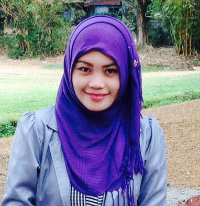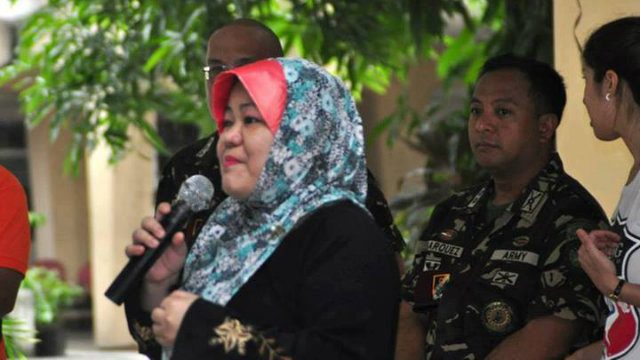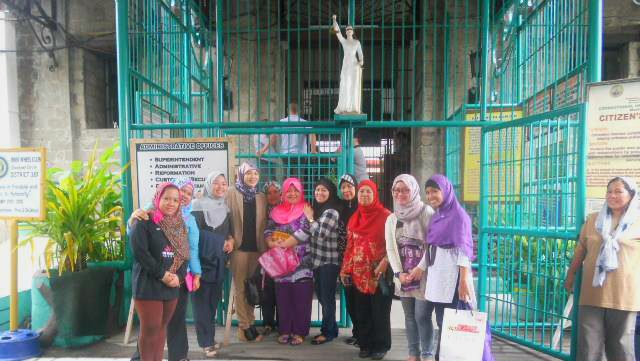SUMMARY
This is AI generated summarization, which may have errors. For context, always refer to the full article.

Her words are tender, yet sincere and speak humility. She truly inspired me as a woman who shares the same interest and advocacy.
Her human rights-based advocacy on women empowerment is a moving one. Known to many as “Aisha” when she converted to Islam, Aisha Flores-Malayang is among the few who go out of their comfort zones to serve others, particularly the less privileged sector of the society.
The saying “behind every man’s success is a woman” is a reality lived by Aisha. She is not just a wife but also a partner of Filipino lawyer Musa I. Malayang, one of the founding members of the Muslim Legal Assistance Foundation in the Philippines. The said foundation provides pro-bono legal services to Muslim victims of human right violations and legal assistance to indigents.

Aisha learned to write pleadings and other legal services to help her husband in their humanitarian advocacy on making “social justice” available to Muslim women in prison – an advocacy that many would find unusual especially for a woman like Aisha who was raised from a conservative Catholic family before embracing Islam by choice.
Women in jail
She is straightforward in saying that the best way to do da’wah (cultural dialogue) is living by example.
Putting aside all the intricacies of the political environment which took place after 9/11 and the consequent “war on terror” by the US government against the Muslim world, Aisha was alarmed by the continuing human right violations committed against her Muslim sisters and brothers, who were arbitrarily arrested by mere suspicion of being a “terrorist” starting in 2003.
From then on, she knew she had to do something.
As a psychologist and teacher at the Institute of Islamic Studies in the University of the Philippines, she developed an emphatic feeling towards the less fortunate.
After visiting the Correctional Institution for Women (CIW) in Mandaluyong in 2005, she felt bad for the great discomfort and uneasy conditions of Muslim women in jail. In particular, she was disturbed upon learning that a significant number of these women behind bars do not deserve to be there. Some were framed-up for crimes they did not commit, others were victims of personal vendetta.
There were also stories of abandonment and condemnation among the women, usually coming from their own families and their communities.
Her deep sense of empathy towards her sisters-in-faith in prison motivated her to establish an organization that would uplift the worsening condition of these women. Her frequent visits to the CIW, alongside fellow advocates, paved the way for the birth of the Muslim Sisters Bridging Society (MSBS) in December 2011. It was formally registered at the Securities and Exchange Commission in 2012.
Of the 13 incorporators, MSBS now only has 4 active members namely; Zainab Ledesma-Daligcon, Braverly Shae Barbado, Crescencia Nani, and Aisha as the Executive Director. All of them were Muslim converts who shared the advocacy of gender-based rights and socio-economic empowerment of Muslim women and women in general.
Living by example

MSBS has a three-pronged intervention for their beneficiaries:
- Psycho-social intervention (i.e., psycho-testing, counseling, group processing)
- Legal intervention (i.e., seeking recommendation for those deserving parole or probationary status)
- Livelihood intervention to uplift their socio-economic condition in jail
It takes a “heroine” to even think of these noble works without expecting anything in return. For Aisha, the feeling of happiness means being able to give rather than to take.
She believes that the reward from the Almighty (In shaa Allah) is giving her a source of inspiration in continuing her advocacy.
As a Muslim and a woman, she feels the need to learn more about her faith, to live with it, and convey the message of peace and unity amidst diversity. She dreams of putting up a women’s center providing opportunities and gainful employment for young Muslim women and men. The center would be an avenue for providing community service in the spirit of the universal value of sisterhood in Islam, and women empowerment as a basic human right in a democratic society.
Her advocacy on uplifting the socio-economic condition of Muslim women in jail and depressed communities is now gaining ground. In partnership with the Bureau of Fisheries and Aquatic Resources in Region IV-A, MSBS was able to provide fishing materials and livelihood trainings on post-harvest production in Camarin, Caloocan City. Seminars are also done to enhance their knowledge on Islamic economics, Halal-food production, and dressmaking.
One of their innovative and creative products is the Borquini, a Muslim version of the swim suit attire, especially designed for Muslim women. This is part of the Abaya Apparel Collection funded by the Philippine-Australian Community Association of the Philippines. To make it fashionable, they partnered with the promising Muslimah fashion designer, Fatimah Guerrero – a Muslim convert now based in Saudi Arabia.
Modest in their mode of dressing, nevertheless, “Muslim women, too, can be fashionable.”
In all these, Aisha – through MSBS – is committed to building more bridges towards just and lasting peace and progress for all, regardless of faith, as partners for development.
She ended our conversation with a sweet smile and candidly said “Kung hindi tayo, sino ang gagawa?” (If not us, then who will?). — Rappler.com
Visit the Muslim Sisters Bridging Society on Facebook to learn more or to participate in their activities.
Yasmira P. Moner is the current Women and Children’s Convener of the Young Moro Professionals Network. She is also a member of the newly-founded Khadija Center for Muslim Women Studies Center. She is a graduate student taking up MA Political Science in UP Diliman.
Got a story to tell? Share your stories and ideas on religion, women, and gender with move.ph@rappler.com. Speak up on #GenderIssues!
Add a comment
How does this make you feel?
There are no comments yet. Add your comment to start the conversation.